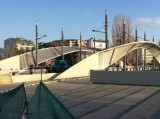Cover photo: The bridge linking the formerly divided city of Mitrovica, Kosovo.
The Green Building Municipality project, a multi-ethnic youth gardening initiative from a conflict region in Kosovo, has won the inaugural Peace and Climate action of European Youth (PACEY) Award, granted earlier this month in Basel, Switzerland.
The award was initiated by the Basel Peace Office to support a European youth project or proposal to advance effective action to cut carbon emissions, enhance the transition to renewable energies, address and resolve international or regional conflicts, abolish nuclear weapons, reduce weapons budgets and investments, and/or support the United Nations Sustainable Development Goals.
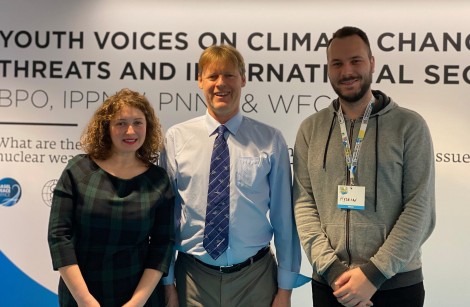
Alyn Ware, Basel Peace Office Director, with Anesa Colakovic and Hysein Damati, co-founders of the Education Innovators, Kosovo, which won the inaugural PACEY Award.
‘Young people in Europe and around the world are standing up to demand action to address climate change, end armed conflict and abolish nuclear weapons,’ says Prof Dr (med) Andreas Nidecker, President of the Basel Peace Office and founder/financer of the PACEY Award. ‘They clearly see the threats to current and future generations, and are calling on city leaders and governments to take action to avert a catastrophe. It’s time we heeded their warnings, listened to their ideas and supported their action.’
A wide range of youth projects were submitted for the award, four of which were short-listed by the PACEY Award jury. They were a youth sailing journey from Latin America to Europe for climate action and peace, a youth peace mural project in the Ferizaj region of Kosovo, a youth-led project focusing on keeping fossil fuels in the ground for peace and the environment, and the Green Building Municipality project in Kosovo.
These projects were presented to Climate, peace and security: From youth voices to policy action, a conference held in Basel on January 9. Conference participants then voted on the short-listed projects to determine the winner.
‘The range, quality and creativity of these projects demonstrates the value that youth can offer to address these key issues,’ says Marzhan Nurzhan, Deputy Director of the Basel Peace Office and a member of the PACEY Award jury. ‘We are excited about providing organisational support for all four short-listed projects – and assisting the winning project further with a €5000 contribution, thanks to the generosity of Dr Nidecker.’
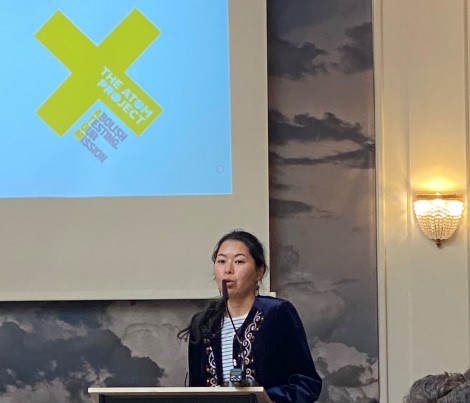
Marzhan Nurzhan speaking at the Basel conference on January 9
The Green Building Municipality project will bring together students aged 10-14 from the Serbian, Albanian, Roma, Turkish, Croatian and Bosnian communities living in Mitrovica, to build community gardens on the rooftops of city-owned buildings.
‘There are strong tensions between members of ethnic communities in this disputed region of Kosovo, and we must find creative ways of helping youth transcend these divisions and create projects together,’ says Anesa Colakovic, co-founder of Education Innovators Kosovo and co-creator of the Green Building Municipality project. ‘In addition, by building roof-top gardens together, we can improve the urban environment and educate youth and the wider community about climate protection.’
'Mitrovica is ready to turn into a symbol of the coexistence between different communities despite the war image that emerged from the inter-ethnic turmoil,' says Hysein Damati, Co-Founder & CEO of Education Innovators Kosovo. 'Young people from different communities need an incentive to accentuate these human values: peace and cooperation. Climate change is a problem for all mankind, so this project will be an extraordinary initiative that will bring together different communities to solve a global problem.'
The Climate, peace and security conference at which the award was granted, brought parliamentarians & city leaders together with youth campaigners from the European climate, peace and nuclear disarmament movements, in order to build connections between the climate, peace and disarmament communities and to build inter-generational dialogue and cooperation.
The event included a keynote presentation by Professor Juergen Scheffran on Connections between Climate, Peace and the Environment and a number of presentations by youth activists, followed by responses to the youth by parliamentary and city leaders.
‘Climatic impact in a number of regions has already contributed to food insecurity, environmental migration and armed conflict,’ said Professor Scheffran. ‘In addition, militarization, armament and violent conflict aggravate climate vulnerability and prevent problem solutions. It’s a vicious circle that can be broken by demilitarisation and emission reduction.’
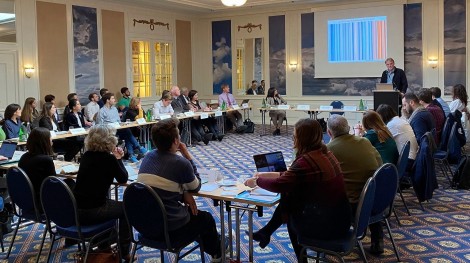
Prof. Juergen Scheffran speaking at the Basel conference on January 9
Professor Juergen’s message was reinforced by a presentation to the conference by youth peace campaigner Jonas Skorzak of the new report ‘The Carbon Boot-Print’, an analysis of the massive climate impact of the US and European militaries.
A key focus of the Basel event was how to turn youth voices on climate, peace and disarmament into effective policy through action by parliamentarians and mayors.
‘Parliamentarians play a crucial part in the process of abolishing (nuclear) weapons and undertaking measures in combating climate change,’ said Christine Muttonen, former President of the Parliamentary Assembly of the Organisation for Security and Cooperation in Europe. ‘They can influence government positions, refuse their consent to allocate money for weapons and divert such money flows (budgets and investments) to instead support climate protection. But we need the younger generation and wider civil society to communicate and spread these actions, and to put pressure on the legislators to adopt these measures.’
‘Cities have historically been absent from international decision making, but victims of the destruction of failed policies on peace/war and the environment,’ said Josep Mayoral I Antigas, Mayor of Granollers and President of Mayors for Peace Europe. ‘Now through Mayors for Peace, a network of over 8000 cities worldwide, cities are becoming more active and effective. And our engagement with youth is vital in this work.’
The conference also included the release of a new video on Youth voices on climate, peace and nuclear disarmament which featured short messages from young people around Europe to policy makers.
‘‘In order to protect the climate, we need to find ways of being active and making our voices heard without significantly increasing our travel – especially air travel,’ says Chaimae Sebbani, Basel Peace Office youth coordinator and producer of the video. ‘We are therefore bringing the voices of many European youth to the Basel roundtable event – and to policy-makers – via statements which we are compiling in this video.’
The video was also presented to participants of the Basel Peace Forum on January 10 at a pavilion on Inter-generational interaction for peace and the climate, and will be part of a youth voices pavilion in PyeongChang, Korea at an event commemorating the Inter-Korean Peace Initiative which was launched at the 2018 Winter Olympics in PyeongChang.
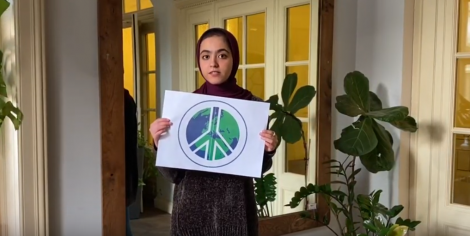
Aisha from Libya participates in the video Youth voices for climate, peace and nuclear disarmament
